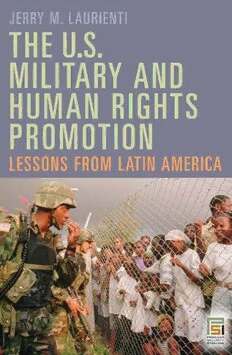
The U.S. Military and Human Rights Promotion: Lessons from Latin America PDF
201 Pages·2007·1.827 MB·English
Most books are stored in the elastic cloud where traffic is expensive. For this reason, we have a limit on daily download.
Preview The U.S. Military and Human Rights Promotion: Lessons from Latin America
Description:
Many years before the U.S. military had to deal with the repercussions of abuses at Abu Ghraib prison in Iraq, the U.S. armed forces were vigorously engaged in helping their Latin American counterparts to recognize the strategic imperatives of respecting human rights on the battlefield. Before Iraqi accusations of massacre at Haditha forced the U.S. military to again scramble to defend its honor and reputation, U.S. forces in Latin America were more than a decade into repairing their image after taking the blame for numerous human rights crises. Indeed, U.S. military relations with Latin America are at the center of numerous academic and policy debates, particularly regarding U.S. military assistance and its impact on human rights and broader democratic development. Until now, however, no book has focused on determining whether the U.S. military could serve as a primary source of human rights promotion. Meanwhile, U.S. military human rights promotion efforts in Latin America have become central to the Department of Defense Strategic Engagement Plan since the end of the Cold War.The significant role of the U.S. military in promoting human rights around Latin America is unmatched by U.S. military efforts anywhere in the world. This book documents an approach to human rights that could become a model for Department of Defense strategy and behavior around the world. Perhaps the most important finding of this book is that the true heroes on the human rights front are not civilians, but U.S. military officials, a conclusion that is too often ignored by activists, missed by scholars, and would have been unthinkable only a decade ago.
See more
The list of books you might like
Most books are stored in the elastic cloud where traffic is expensive. For this reason, we have a limit on daily download.
